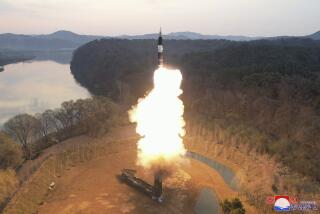The Danger Finally Hits Home
- Share via
The ballistic missile launch by North Korea over Japanese territory this week has at last awakened a slumbering Japanese public to its strategic vulnerabilities and the absolute need for Japan to embrace a missile defense program with the United States.
The psychological impact of the missile test on the Japanese public cannot be understated. Unlike North Korea’s test firings of the Rodong missile into the Sea of Japan in 1993, the weapon fired this week invaded Japanese territorial space for the first time.
Since Japan’s wartime defeat more than 50 years ago, when the country disarmed itself of offensive weapons and promulgated a peace constitution, most people have developed a severe allergy to even thinking about military affairs, let alone discussing them. Nestled in the comfort of the U.S. nuclear umbrella, the public has come to take its security for granted, like water and air. External threats have been downplayed or even denied by the dovish establishment, and the Japan Defense Agency has been hobbled by a lack of public prestige and respect. Those who advocate stronger security ties with the United States, including the missile defense program, are typically painted as hawks eager to return to the bad old days of military aggression. But the North Korean missile launch has begun to change this public complacency by proving that a very real threat does exist.
The plodding government of Keizo Obuchi uncharacteristically has sprung into action, quickly issuing a list of measures to be taken against North Korea: freeze negotiations to normalize diplomatic relations; delay implementation of the 1994 deal under which the United States, South Korea, Japan and other countries agreed to provide North Korea with two light-water nuclear reactors and provide heavy fuel oil for 20 years in exchange for Pyongyang’s pledge to abandon its nuclear development program--Japan had pledged at least $1 billion; cease food aid to North Korea--Japan has contributed more than $34 million since 1995; set up an international framework to stop the development of medium-range ballistic missiles, such as the Rodong and the longer-range Taepodong.
A consensus is building among top government officials and the ruling Liberal Democratic Party to reconsider the joint missile defense project, which the U.S. has promoted for several years. Until now, the Japanese government has not embraced this project because of the steep cost, concerns about feasibility and fear of antagonizing China. The project is designed to shoot down ballistic missiles with tactical weapons and aimed at defending U.S. forces in foreign countries as well as allies such as Japan.
Although the Japan Defense Agency wanted to request funds for technical research this year, officials were pressured not to do so because it would cause friction with China on the eve of President Jiang Zemin’s visit to Japan this month (which has been canceled because of China’s floods).
Of course, some opinion leaders in Japan are still wary of the project. The dovish Asahi Shimbun condemned North Korea and declared that “it is impermissible to wield a sword in one hand and ask for assistance with the other.” But it urged caution in proceeding with the missile defense program and concluded that “the nation must lower the level of threat through diplomatic efforts.”
The problem, however, is that Japan’s diplomatic efforts and concrete gestures of friendship to North Korea have wielded almost nothing, as the public is beginning to realize. When officials requested information on the suspected kidnapping of Japanese nationals, Pyongyang replied that it had found the charges entirely baseless, despite credible reports of sightings. A long-standing request to allow Japanese wives of North Koreans to visit their homeland yielded just two visits before Pyongyang abruptly suspended the program. The latest missile launch is the worst provocation so far.
When China launched several missiles off the shore of Taiwan in 1996, the U.S. rushed to dispatch two aircraft carriers from their mother ports in Japan. The missiles not only threatened Taiwan’s security but Japan’s sea lanes as well. That “China threat” helped transform Japanese reluctance into support for an expanded military role in cooperation with the United States under the 1997 guidelines governing the long-standing U.S.-Japan Security Treaty. Likewise, the “North Korean threat” is likely to mobilize Japanese public support for the “Star Wars”-like missile defense program.
Despite concerns about the program’s cost, particularly amid the severe economic downturn, and about China, Japan’s security is priceless. Just as a prudent homeowner invests in an alarm system, so should Japan take all measures to properly protect itself.
More to Read
Sign up for Essential California
The most important California stories and recommendations in your inbox every morning.
You may occasionally receive promotional content from the Los Angeles Times.










